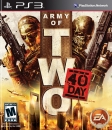Veknoid_Outcast said:
OK, then please unpack that term. When you say "objective," what do you mean? Does that mean you want a journalist who writes without any personal feelings or interpretations? That is a useful thing to have in a reporter, certainly. But when it comes to a reviewer, he should most definitely include his personal feelings and interpretations. Because those feelings and interpretations, along with his experience playing games, are what gives his position meaning. No one can, and no one should, evaluate a piece of art in an objective way. You can either have a dispassioned description of a game or you can have a subjective critical analysis. You cannot have both. |
Interpretations are fine, but personal feelings need to be put aside. A critic can give a passionate description of whatever they're reviewing and still give an unbiased review. What a critic shouldn't do is grade something based on a personal bias. As a professional, if you hate RTS games, you need to put that hatred aside and base your critique on the merits/short-comings of the game, or not review it at all.
I am the Playstation Avenger.
|
|























